In celebration of our 20th anniversary, UK DCTN members share their reflections of the Network in this blog series.
Since then, I have joined a James Lind Alliance Priority Setting Partnership for Pemphigus and Pemphigoid diseases; I have re-joined the UK DCTN Steering Committee; and I have been closely involved in a joint initiative with the BDNG (British Dermatology Nursing Group) to help improve education and involvement in research for nurses.
Working with the UK DCTN has in part given me the experience and confidence to be a Nurse Principal Investigator for two dermatology studies - OASIS and BADBIR. Being responsible for a study is an exciting and challenging role and one which I believe nurses are well able to fulfil. Being accountable for but also running the study day to day gives a unique perspective into the success of the study at site, gives hands on experience of managing issues but also provides a broad overview for multicentre studies. Of course, being part of the team submitting papers for publication can be quite a journey on its own!
Reading the most recent UK DCTN annual report I was reminded how many amazing studies have come through the UK DCTN, we have participated in several, OASIS, THESEUS, TREAT, SPOT and are due to join the BEACON eczema study. Even those we have not participated in I feel I have a vested interest in as I became aware of many of them during my first stint on the steering group and continue to keep an eye on progress from afar.
I have been a dermatology research nurse for 10 years and the last 8 of those I have been working with or alongside the UK DCTN in some form or other, this has given me opportunities I would not have had otherwise, and I have met and worked with some wonderful colleagues. If you have the opportunity to apply for a UK DCTN Fellowship I would strongly encourage you to grab it with both hands, you won’t regret it.
Previous blogs
Research is a quest - Dr Alia Ahmed
My journey with the UK DCTN began with the trainee mentoring scheme. I submitted a research idea to investigate the impact of psychological interventions on people with vitiligo. Through working with a larger team of dermatology trainees, expertly mentored by Dr Jonathan Batchelor and Dr Rosalind Simpson, the ‘idea’ became a fully-fledged study application for the UK DCTN themed research call in 2013. We were delighted to receive the award to develop our study, titled: ‘Is psychological intervention better than standard care alone in the management of vitiligo? Feasibility work to assess the best intervention and run a pilot randomised controlled trial.’
Knowing that our exploratory work was supported by the wider dermatology community represented by the UK DCTN was the catalyst we required! Having £10,000 at our disposal allowed us to conduct, present and subsequently publish our research. It was not plain sailing though! The process started in 2013 culminated in our publication in 2018. Having the funding and support to move our idea forward, still required a coordinated team effort to tick the all important boxes along the way (I still remember presenting to the research ethics panel like it happened yesterday!). Our hands were firmly held by stalwarts like Dr Carron Layfield, Prof Hywel Williams and Maggie McPhee and our mentors, keeping us in line and on target.
But what did I learn and what do I remember? The funding was used very wisely and spent on facilities for our patient participants and on the all-important hacks that would make our lives as researchers easier (like transcription services!). The hours spent on following this idea through cannot be financially compensated, but research is a labour of love. Recently, I have been involved in discussions with a new research team, headed by another esteemed colleague - Dr Viktoria Eleftheriadou. They will be using our results to inform further work on vitiligo. The funding from the UK DCTN has given me a lot more than a kick start for one research study. Since this experience, I have maintained close links with the Network as a member of the trial prioritisation panel, becoming a trainee mentor and most recently leading a virtual journal club for dermatology trainees.
Research is a quest, which has many definitions, but my favourite is “a usually adventurous journey made in search of something”. I am delighted to report that the journey continues!
My thanks to the research team: Professor Anthony Bewley, Dr Jonathan Batchelor, Dr Rosalind Simpson, Mrs Maxine Whitton, Dr Liz Steed, Dr Reena Shah, Dr Esther Burden-Teh, Dr Saibal Sanyal and Dr Chioma Ajaegbu.
Pictured right - me and my mentors in 2013.
I found it difficult to know how to access research opportunities... Dr Zoe Venables
I  like to think of medical research akin to being a slightly geeky astronaut, exploring exciting unknown territories and progressing humankind, but from the comfort of terra firma. With this in mind, I have always had a keen interest in research throughout my medical career but found myself distracted by my career priority of becoming a dermatologist. Once I became a dermatology trainee, I found it difficult to know how to access research opportunities and this is where the UK DCTN entered my universe.
like to think of medical research akin to being a slightly geeky astronaut, exploring exciting unknown territories and progressing humankind, but from the comfort of terra firma. With this in mind, I have always had a keen interest in research throughout my medical career but found myself distracted by my career priority of becoming a dermatologist. Once I became a dermatology trainee, I found it difficult to know how to access research opportunities and this is where the UK DCTN entered my universe.
In 2015 I applied to be involved in the UK DCTN eczema trainee group. This was a unique opportunity to work in a research group to firstly develop a research priority and then present this to our peers. We identified the clinical equipoise regarding the order of emollient and corticosteroid application in eczema as a priority. Working together as a group with support from our research mentors we developed and published results from a national questionnaire assessing current practice and we worked with industry representatives to develop a clinical trial. This experience taught me key skills notably the importance of identifying the correct research question. Ultimately, it led me to develop my own research interest in skin disease epidemiology as well as encouraged me to be more critical of research outputs and its interpretation and in turn, to become a better doctor.
The UK DCTN is a unique network which has initiated a paradigm shift in the way we develop research in the UK by empowering patients and clinicians through creating greater opportunities to be involved in research. As a result, the UK DCTN has developed high quality research outputs which have changed clinical practice worldwide and positively impacted upon the care our patients receive.
Invaluable Training and Mentorship - Dr Natalie King-Stokes
Many trainees struggle to gain experience of clinical research during their busy training programmes, the educational opportunities offered by the UK DCTN, from its fantastic courses and journal clubs to the fellowships and trainee groups programme, are highly valued and sought after. My time as a member of a UK DCTN trainee group in 2021 was not only a fantastic learning experience, but has also led on to exciting research opportunities. It has also enabled me to collaborate with an amazing team of trainees and dermatologists from across the UK and receive invaluable mentorship along the way.
For those who have not heard of the UK DCTN trainee groups programme, it is primarily an educational exercise for dermatology trainees to learn how to develop a research question and design a clinical trial to answer it. The trainee groups are supported and guided by UK DCTN mentors to develop their study idea and present a clinical trial proposal at a face-to-face study day six months later. After an initial training event, where we were equipped with knowledge and resources that would help us with our task, our group met virtually on a regular basis, where we would take our study from an initial idea, to defining (and refining) a research question, to determining how this could be answered with a clinical trial. One of the best aspects of the trainee groups was the opportunity to work with trainees and consultants with a shared interest, in our case paediatric dermatology, and a variety of different clinical and research backgrounds. Our group has continued working together on our project and even recruited further members, including patient representatives. Collaborating with patients at an early stage in a project is at the heart of the UK DCTN’s ethos, providing integral input to the design and conduct of studies.
What started as an educational exercise, turned into a feasibility study exploring the effectiveness and acceptability of teleconsultations for follow-up of paediatric eczema compared to face-to-face consultations. We have carried out a national survey to clinicians to establish the current practice and experiences of teleconsultations within paediatric dermatology, the results were presented at the BAD Annual Meeting. One of the highlights of the trainee groups experience was going on to submit a successful funding application for the UK DCTN’s paediatric dermatology themed call award. Two of us were subsequently awarded Topol Digital Fellowships, which provide us with protected time to work on our feasibility study, as well as receiving training in digital health transformation. I would like to thank the UK DCTN for the invaluable training and mentorship opportunities it has given so many trainees over the last 20 years and encourage trainees to continue to get involved with this amazing organisation.
Hanging around the UK DCTN - Dr Debbie Shipley
I have hung around the UK DCTN for a very long time in various guises, since the early days of the PATCH (cellulitis) studies. I was so excited when PATCH was over I sent cupcakes, not something I would do for any old study team. This is a testament to what a great bunch of people they/we are…
I have learned a huge amount watching the process of taking a study from a first idea ‘vignette’ to published results. Watching the experts (with all kinds of expertise; clinical, personal, statistical) critique, interrogate and refine ideas always makes the meetings worthwhile. As a non-academic, general dermatologist I would not have experienced this in the same depth without the UK DCTN.
My involvement has given me the confidence to take on research roles that I would not have dared to otherwise. I respect the patient centred and inclusive ethos, which has always felt a bit ahead of curve.
Anyone that has ever asked me a direct question knows that I can be barely coherent in my immediate response (I spend an unhealthy amount of time cringing with embarrassment at things I could have said better). Don’t worry. If you are experiencing ‘L’esprit de l’escalier’ you can always contact Carron after the meeting, with your best thoughts. Fabulously beneficial to those of us that needs it, and probably one of the reasons I have survived this long.
I was an inexperienced registrar when I first got involved, so, watching new people joining the group is inspiring. I know that they to are going to get a first rate, valuable experience and the pragmatic useful dermatology studies that the UK DCTN prioritises will continue.
Hywel was ahead of the game.... - Professor Catherine Smith

Hywel was ahead of the game in setting up the UK DCTN. A multi-disciplinary, collaborative and inclusive UK network to address questions that matter to patients and clinicians, and to inspire individuals to learn about, and contribute to research. It might seem surprising now but at the time, this model, and the notion that clinical research is everyone’s business, challenged the status quo. It also meant that when the NIHR was formed in 2006, the UK DCTN was ready with high quality research proposals to improve patient care, and that dermatology as a whole ‘punched well above its weight’ – raising the profile of skin disease and impact and highlighting the calibre of our clinical research community.
From a personal point of view, the UKDCTN has played a crucial role in two key projects. The first - our trial in palmoplantar pustulosis (APRICOT). This was a challenging trial to design and deliver - PPP is rare, the intervention (anakinra) was a daily injection, and the comparator a placebo. The UK DCTN kept awareness and motivation high so that we were able to complete recruitment to target if not completely to time! And whilst we didn’t show any benefit with anakinra we have a valuable PPP registry of potential future trial participants (as well as an aligned bioresource – PLUM – which continues to be used to understand disease drivers) where the unmet need remains.
The second is BEACON. This is the world's first platform trial in adult atopic dermatitis with Andrew Pink our CI and funded through the NIHR. This is so exciting. Achieving the NIHR HTA funding was successful in large part because of Jo Chalmers who worked so hard to facilitate patient input into the design, writing the grant with us, and generally co-ordinating everything (we miss you Jo!). Thank you to Carron for promoting the trial to the network and thank you to all the PIs who are leading study site teams and will make the trial happen when we open recruitment in 2023. And of course, thank you to Hywel. For encouraging us to go for it in the first place, for a wise steady hand to get us to this stage, and for continuing to be part of the study team- I hope for the foreseeable future.
I was very fortunate to receive the UK DCTN Neil Cox SpR Fellowship award in 2018 - Dr Fiona Tasker
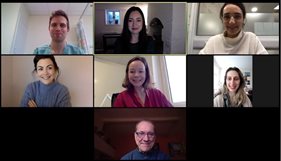
During my fellowship I have been involved in many projects, including being the lead on two systematic reviews (SRs). I learnt from Hywel Williams that SRs are often poorly performed, and therefore with the support of a great team I aimed to produce high quality reviews with reliable results that would be helpful and benefit patients.
I would like to say a huge thank you to Rosalind Simpson, Lisa Kirby, Douglas Grindlay and Fiona Lewis who I worked with to complete an important systematic review on the current evidence base for laser therapy for genital lichen sclerosus (LS): https://onlinelibrary.wiley.com/doi/full/10.1002/ski2.52.
We aimed to gather evidence on this emerging treatment and demonstrated that at present there is poor evidence to support the use of laser therapy for genital LS. We published this information and it now features in the recent updated European guideline for the management of vulval conditions (https://onlinelibrary.wiley.com/doi/10.1111/jdv.18102). We hope this work will help clinicians and patients make more informed choices if considering the option of laser treatment for genital LS.
I would also like to thank Karen Harman, Alistair Brown, Natasha Rogers and Douglas Grindlay for their input into the annual eczema SR (https://onlinelibrary.wiley.com/doi/full/10.1111/ced.14303).
in 2020 the fantastic cohort of UK DCTN Fellows and I created the UK DCTN virtual journal club. The first series focused on how to critically appraise different classical research methodologies including systematic reviews, randomised controlled trials, cohort studies, case control studies and qualitative studies.
Our journal club has been very well received and attendees have described the sessions as ‘very useful and relevant’ and feel it is ‘a great hour of learning’. Dermatology trainees have ‘better understanding on how to appraise papers’ and enjoy the ‘very friendly, welcoming’ and ‘positive environment’. This initiative has been particularly helpful to those who do not have access to a journal club and we are pleased to have been able to create this opportunity for them. I whole heartedly want to thank my talented colleagues Alison Sears, Lisa Kirby, Alistair Brown, Bayanne Olabi, and Veronica Melchionda who helped me create this brilliant resource for trainees to learn and practice critical appraisal skills.
I feel honoured to be associated with an organisation with such a strong moral compass driven by people who are inspirational, and by working together as a team have succeeded in achieving the vision of delivering better evidence-based care for many patients.
Developing a clinical trial in skin surgery with the UK DCTN - Dr Rachel Abbott
I n 2015, I supervised a UK DCTN trainee research group who developed the research question ‘Do peri-operative antibiotics reduce the risk of wound infection after excision of ulcerated skin cancers?’ Today I work 80% as an NHS Dermatologist and Mohs Surgeon and I have 20% funded time for clinical research. Here’s my experience of how the UK DCTN encouraged my interest in clinical research and led to me developing a clinical trial.
n 2015, I supervised a UK DCTN trainee research group who developed the research question ‘Do peri-operative antibiotics reduce the risk of wound infection after excision of ulcerated skin cancers?’ Today I work 80% as an NHS Dermatologist and Mohs Surgeon and I have 20% funded time for clinical research. Here’s my experience of how the UK DCTN encouraged my interest in clinical research and led to me developing a clinical trial.
Between 2015-2017, the UK DCTN trainee group conducted a clinician survey of current practice, a multi-centre audit and a literature review. At this point, we decided that an observational study would be helpful to determine the proportion of patients who develop wound infection after surgical removal for ulcerated skin cancers. This would be critical for determining the sample size for a future trial. Given that it is difficult for trainees rotating around hospitals to set up a clinical study, I took on the role of Principal Investigator for the ‘Observational study to investigate surgical site infection in ulcerated skin cancers’ – OASIS feasibilitystudy. We collaborated with Microbiologists from Public Health Wales and experienced researchers and statisticians from the Centre for Trials Research at Cardiff University and we were successfully awarded £10K funding by the UK DCTN with a Pump-Priming Award in 2017. After obtaining appropriate regulatory approval, the OASIS study opened for recruitment in University Hospital Wales, Cardiff in March 2019 and later in Oxford University Hospitals NHS Foundation Trust. The study closed in March 2020 after recruiting 140 participants. The results showed a high proportion of participants with wound infection after surgical removal of an ulcerated skin cancer using the Bluebelle Wound Healing Questionnaire (WHQ) as the outcome measure to determine wound infection.
Our research group has grown to include patients, Qualitative Researchers, Health Economists, Plastic and Maxillofacial Surgeons. And we are now developing a randomised controlled trial ‘EXamining antibiotics for ulCerated skIn cancer Surgical Excision’ – EXCISE with the ongoing support of the UK DCTN. The aim of this trial is to determine what is the minimum duration of antibiotics that can be prescribed while still providing acceptable levels of wound infection risk? We have undertaken further surveys of UK clinicians who regularly carry out skin cancer surgery - including Plastics Surgeons, Maxillofacial Surgeons and Ear, Nose & Throat Surgeons as well as Dermatologists - to ask about their current practice and their thoughts on our proposed trial. And we have presented our proposed trial to the the Centre of Evidence Based Dermatology’s Patient Panel (co-ordinated by the UK DCTN) and received encouragement as well as helpful feedback particularly about the trial design.
We plan to apply for NIHR HTA funding for the EXCISE trial later this year and we are currently working on a ‘durations’ trial design where we randomly allocate participants to a range of antibiotic course durations (including no antibiotics). This is just one example of the many research concepts that I have learned over the last few years as well as the enjoying the pleasure of working with patients, researchers and clinicians with the mutual aim of increasing the evidence-base for skin surgery.
Seven years and six research projects - Dr Aaron Wernham
 I'm surprised it’s already been seven years since I first became involved in the Network. Having started off in one of the trainee research groups which led to the development of the OASIS study (examining the role of peri-operative anti-biotics for excision of ulcerated skin cancers), I feel fortunate to have met two inspirational past fellows at this point – Rachel Abbott and Rubeta Matin, who guided our registrar group through the initial phases of developing a new trial idea. This ignited my interest in clinical research and a thirst to build on current knowledge through rigorous trial design, resulting in my subsequent application for the UK DCTN Fellowship award.
I'm surprised it’s already been seven years since I first became involved in the Network. Having started off in one of the trainee research groups which led to the development of the OASIS study (examining the role of peri-operative anti-biotics for excision of ulcerated skin cancers), I feel fortunate to have met two inspirational past fellows at this point – Rachel Abbott and Rubeta Matin, who guided our registrar group through the initial phases of developing a new trial idea. This ignited my interest in clinical research and a thirst to build on current knowledge through rigorous trial design, resulting in my subsequent application for the UK DCTN Fellowship award.
The fellowship award provided the core foundations to develop a successful career in clinical research, initially learning from Hywel Williams how to critically appraise and search the depths of every article for bias, even where this may not be initially apparent. I continued to assist Rubeta and Rachel develop the OASIS study which has now finally come to fruition with recent publication, leading on to a proposed RCT – the EXCISE study. I learned about past challenges UK DCTN researchers have faced when delivering national studies and what to be mindful of when progressing a trial idea.
The fellowship provided ample opportunity to build networks both in the UK and internationally and led to the completion a priority setting partnership in skin cancer surgery - the top 10 research priorities have now been published. The Network has also put me in touch with an international collaboration to develop core outcome sets for skin surgery. In addition, the HEALS study has made it through stage 1 of the HTA application which is an exciting step forward to better understand the efficacy of compression for lower limb surgery.
The CANVAS study looking at absorbable versus non-absorbable sutures was the first collaboration between the UK DCTN and the Reconstructive Surgical Trials Network and highlighted the power of working together with other specialties and also the power of the registrar and trainee workforce in delivering outcomes and data collection on current surgical practice. Through all these works, it is evident that the fellowship programme has certainly steered the trajectory of my career in ways I hadn't expected and I look forward to seeing future fellows go from strength to strength and adding high quality evidence to our clinical practice.
One nurse’s view on a decade with the UK DCTN – Prof Fiona Cowdell
The UK DCTN commitment to “work in partnership with healthcare professionals and patients to prioritise research questions thereby helping to generate a better evidence base for dermatology patient care” has always been close to my heart as a nurse and researcher.
I was fortunate to be the first winner of the UK DCTN nursing prize in 2008 and this proved to be the catalyst to an enduring relationship. I had just moved from a clinical and senior management role in the NHS to academia and was finding my feet in the world of research. In those early days I was struck by Professor Hywel William’s sage advice to always do “really good research” and that duty has become a touchstone as I’ve progressed from novice researcher to Professor.
By definition, the UK DCTN is all about clinical trials which are traditionally medically focused. In the many meetings I’ve contributed to and papers I’ve read I have learnt so much about dermatology and research methods that are not my natural domain. Equally I hope I have influenced colleagues to think differently in three key areas.
I have flown the flag qualitative research to:
- Ensure we identify research questions that are important for patients and the public as well as practitioners and researchers
- Understand patient perspectives more fully and engage with them throughout the research process
- Give a fuller picture of patient experiences and views than would be achieved by RCT alone
I have championed the role of nurses. It’s so important that research teams include nurses. We are often the people who know patients best and are aware of the trials and tribulations of managing skin conditions. We have so much to contribute but are often relegated to recruitment and data collections rather than using our expertise in the research process from beginning to end. A good team is more than the sum of parts and the mutual learning and discussion informs not only the research, but the research process. Currently I am working in a UK DCTN collaboration with British Dermatological Nursing Group on a series of publications and webinars for dermatology nurses to build their confidence, competence and contribution research. We are always seeking further opportunities for nurses to inform and engage with research processes and teams.
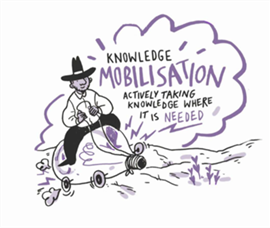
More recently I’ve been promoting the knowledge mobilisation agenda. As we all know so much research is wasted, or implementation delayed, and it is incumbent on us to ensure new knowledge is used to improve care. Knowledge mobilisation is all about “moving knowledge across communities to catalyse change”. It vital that research teams think about who needs access to the knowledge they generate and plan how this can happen early in the research cycle.
When I reflect on my membership of the UK DCTN and role on the executive committee and as a Trustee, I am proud to be part of an inclusive organisation which values the views of patients, practitioners and researchers alike. It has been a joy working with like-minded people and I’ve learnt so much. I hope I have generated interest and engagement in my areas of expertise. Now as Professor my intention is to continue to do really good research and inspire the next generation to do likewise.
I wanted to be a better dermatologist - Dr Areti Makrygeorgou
SA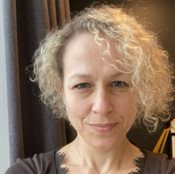 S Doctors are a heterogenous grade of doctors coming from different backgrounds, with different levels of experience and knowledge. In the past 17 years, when I have worked for the NHS, there have been different titles: Non-Consultant Career Grade Doctors, Specialty Doctors, Staff Grade Doctors, Fellows, Associate Specialists. The posts are created “for service” or “for career” etc. Formalizing the CESR route has clarified a lot on the SAS doctors career path and development, even for the ones, who do not follow the CESR option and things are more straightforward now.
S Doctors are a heterogenous grade of doctors coming from different backgrounds, with different levels of experience and knowledge. In the past 17 years, when I have worked for the NHS, there have been different titles: Non-Consultant Career Grade Doctors, Specialty Doctors, Staff Grade Doctors, Fellows, Associate Specialists. The posts are created “for service” or “for career” etc. Formalizing the CESR route has clarified a lot on the SAS doctors career path and development, even for the ones, who do not follow the CESR option and things are more straightforward now.
The UK DCTN fellowship came to me, when I was still trying to understand my role and what was expected from me by the NHS and my colleagues. What I knew was, that I wanted to be a better Dermatologist, discover what I could do and keep developing. The UK DCTN offered me exactly this without grades or titles: to become better. Although the fellowship was not clinical, everything I did influenced my clinical practice by learning to “chase” the evidence behind everything I do, by critically appraising everything I read and by learning how to make the most of medical literature. I appreciated research and how strongly linked it is to clinical practice. It enhanced my clinical supervision of Dermatology trainees. I engaged in demanding projects but I received a lot of reward and knowledge. The interaction with the UK DCTN team was invaluable and their enthusiasm contagious. After the fellowship was concluded, I continued the collaboration and the Department, where I work, became a recruiting centre for clinical trials supported by the UK DCTN. I was pleased to see that after my fellowship, other members of my local team (trainees and Specialist Nurse) became also the recipients of UK DCTN fellowships or participated in the Trainees Groups of the UK DCTN.
The UK DCTN fellowship was undoubtedly a turning point in my career and I am grateful for the opportunity offered to me.
Being a part of the UK DCTN is an honour and a privilege - Dr Rubeta Matin
It  is the only multidisciplinary collaborative that supports and delivers high-quality randomized clinical trials (RCTs) for patients with skin disease in the UK. I first became involved as a registrar when I was trying to determine what kind of researcher I wanted to be and initially joined to better understand what clinical research was being done in dermatology. Shortly after, I applied for the newly established Neil Cox SpR Fellowship Award (set up in memory of the late Neil Cox who was lead clinician for the first fully funded UK DCTN studies, the PATCH trials) and became the first successful recipient of this award.
is the only multidisciplinary collaborative that supports and delivers high-quality randomized clinical trials (RCTs) for patients with skin disease in the UK. I first became involved as a registrar when I was trying to determine what kind of researcher I wanted to be and initially joined to better understand what clinical research was being done in dermatology. Shortly after, I applied for the newly established Neil Cox SpR Fellowship Award (set up in memory of the late Neil Cox who was lead clinician for the first fully funded UK DCTN studies, the PATCH trials) and became the first successful recipient of this award.
The fellowship really opened my eyes to a world of clinical trial methodology and evidence-based medicine that I soon realised was a discipline that no-one else was teaching or talking about but that we are all expected to be competent in. Until this point when people discussed research I was under the impression that there were only two types – epidemiological and scientific research in the laboratory. Having completed a PhD in the lab and realised that this wasn't my calling in life, the UKDCTN provided an avenue of intellectual stimulation that I wasn't expecting. It taught me the challenges and opportunities to successfully navigate the journey of developing a clinical trial to answer a clinically meaningful question for a patient with skin disease.
Following my appointment as the chair of the Trial Generation and Prioritisation Panel (TGPP) in 2018, I have had a front row seat witnessing all the RCT proposals submitted to the UKDCTN across various stages of their development. It has been an amazing learning experience and incredibly rewarding to see how these trials have evolved and how the support and guidance provided from the TGPP and the Steering Group have shaped them to successfully receive funding.
The highlight of my tenure as TGPP chair has really been to witness the success of the UKDCTN Trainee Group programme – this has helped to reach more dermatology trainees than the fellowship and develop personal relationships through mentorship and peer-to-peer collaboration. It began as an idea shared by general surgical trainees in the West Midlands which started in 2013 and I was delighted to see the 4th cohort complete the formal part of the programme in 2021. Being a mentor for the trainee programmes has been very gratifying as I feel that I have contributed to developing the future clinical academics who are delivering clinical trials across different subspecialities in dermatology.
On the 20th birthday of the UKDCTN, I really want to celebrate its success and particularly give thanks to the team behind it who have helped me to become the clinical academic that I am today – the supreme leadership by the ever-energetic Professor Hywel Williams, the wonderful support provided by Carron Layfield and Maggie McPhee who made my job as the TGPP chair so easy and finally the ethos that pervades the network which centres around learning about, developing and delivering high-quality clinical trials focused on answering meaningful questions for patients with skin disease. I look forward to the next 20 years and the success that it brings!
As an eczema patient who has been struggling with eczema for over 30 years... Tim Burton
 It has to be said that I am no expert when it comes to clinical research. I am, however, very much an expert when it comes to ‘lived experience’ of eczema and all the many eczema treatments I have used. Being a member of the UK DCTN steering group and executive committee since October 2017 has allowed me to provide input into many research studies.
It has to be said that I am no expert when it comes to clinical research. I am, however, very much an expert when it comes to ‘lived experience’ of eczema and all the many eczema treatments I have used. Being a member of the UK DCTN steering group and executive committee since October 2017 has allowed me to provide input into many research studies.
I have been involved in skin research via the Centre of Evidence Based Dermatology Patient Panel for over ten years now and working with the UK DCTN has been an eye opening experience for me. Initially getting involved in research as a way to learn more about eczema and eczema treatments, I soon realised that my accumulated knowledge is of great use in helping others through research, something I have always been keen to do. Skin diseases are all too often trivialised, it’s great that such a large group of like minded people are helping to change that.
The UK DCTN members have been so welcoming and I feel that my input into research projects is genuinely valued and taken on board, whatever my opinion. Although my knowledge of skin diseases is limited (but growing!), everyone has been very respectful in answering my questions and not making me feel like an outsider (or stupid!). I have been made to feel like a valued member of the team, which is great. The meetings can be quite intense, but are very enjoyable and I always come away having learnt something new. Whether it’s about a skin disease I knew nothing about previously or an idea to treat things using a new approach or maybe to compare an new treatment with an existing one.
It’s great to see such collaboration going on and to be involved. All of the great work the UK DCTN is doing is ultimately for the benefit patients such as myself and I believe every member is truly focussed on this goal.
It’s great, as a patient, to be invited into a completely different world and to help shape some fantastic research and be part a the network. I believe that it is so important that research is directly relevant to patients in the real world and the fact that the members are from differing backgrounds, GP’s, nurses, researchers, dermatologists, as well as patients helps achieve this. Credit to the UK DCTN for ensuring that the ‘patient voice’ is heard loud and clear.
At time of writing there are ten on-going studies, which is great. I am look forward to getting involved again at the next meeting in October.
My UK DCTN Journey - Alison Lowe
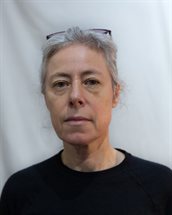 My journey with the UK DCTN started with considering the needs of my patients. I work in Brighton as a Dermatology clinical nurse specialist. I was involved in BADBIR (British Association of Dermatologists Biologic and Immunomodulators Register) and other studies, but it had stopped due to lack of research staff. I felt that patients were not being best served as BADBIR contributes to our understanding and use of biologics. I offered to help gather data for BADBIR in Brighton so that we would continue to contribute to the register and ultimately help patients. Just after this time, I saw an invitation to apply for the UK DCTN Nurse Fellowship, which timed well with my increasing involvement in research. I didn’t really know what the nurse fellowship entailed. I discovered it is a programme of training; opportunities to get involved in research; and mentorship. In this blog want to reflect on how it has changed me.
My journey with the UK DCTN started with considering the needs of my patients. I work in Brighton as a Dermatology clinical nurse specialist. I was involved in BADBIR (British Association of Dermatologists Biologic and Immunomodulators Register) and other studies, but it had stopped due to lack of research staff. I felt that patients were not being best served as BADBIR contributes to our understanding and use of biologics. I offered to help gather data for BADBIR in Brighton so that we would continue to contribute to the register and ultimately help patients. Just after this time, I saw an invitation to apply for the UK DCTN Nurse Fellowship, which timed well with my increasing involvement in research. I didn’t really know what the nurse fellowship entailed. I discovered it is a programme of training; opportunities to get involved in research; and mentorship. In this blog want to reflect on how it has changed me.
The most obvious change has been an increase in my understanding of research methods and critical appraisal skills. Initially, this was through the Better Evaluation of evidence and Statistics (BEES) course which was part of my fellowship. This was followed by regular critical appraisal sessions with other UK DCTN fellows and Professor Williams. Personal study, and other opportunities, such as taking part in educational webinars for the British Dermatological Nursing Group (BDNG)/UK DCTN working group, has consolidated my understanding of research methods.
Becoming a nurse fellow has increased my professional and academic confidence. I still suffer from ‘imposter syndrome’ but I am more able to listen to my rational mind and value my skills in utilising research at work. Being more confident in research skills means I am more able to contribute to shaping local health services. For example, suggesting or deciding which studies to apply for as a department, or applying research findings to changing practices at work. Without the nurse fellowship I would not have had the opportunities it gave me. These include: speaking at the BDNG conference; writing an article with Prof Williams; being part of a systematic review; and being a member of the BDNG/UK DCTN working group. These opportunities have meant I have met some inspiring people, believe I can take on challenges, and know I can make a difference to patients. It also meant I had the confidence to agree to undertake teaching at Brighton University and apply for a new job role (which I got!)
Ultimately, it is the patient that matters in all this. As I look forward to my new job, I know that I am very keen to ensure best practice for patients by leading a “pragmatic implementation of research” (Fielding et al ,2022). I also want to be a role model for my new nursing colleagues, to help improve their confidence in utilising research, inspire them to learn more about research and the work of the UK DCTN, and finally ensure this translates as best practice for their patients too.
It must have been 2007 when I joined the UK DCTN - Dr John Ingram
It was just after starting my registrar training, then becoming one of the inaugural UK DCTN Registrar Fellows soon afterwards. Evidence-based critical appraisal sessions with Hywel started by phone, dissecting trial papers, followed by a visit to Nottingham. It was a steep learning curve and an experience that led to many other opportunities.
I joined the UK DCTN Steering Committee and got to see first-hand how an idea can grow into a trial vignette, perhaps followed by preparatory survey work, then a funding application and, with the right support and encouragement, a fully funded study. Seeing trials like STOP GAP and BLISTER deliver vital results for rare skin conditions showed the power of collaboration and embedding trial recruitment into routine clinical practice across the UK, all supported by UK DCTN.
Seed corn funding from the UK DCTN has been important to provide early support for researchers and research fields that are just starting out. I was one of quite a few fortunate recipients of funding, allowing me to conduct the hidradenitis suppurativa (HS) Priority Setting Partnership (PSP), which has provided one of the foundations for future HS research.
The HS PSP was one of building blocks that allowed me to put together a consortium of dermatologists, plastic surgeons, patient research partners and methodologists to gain an NIHR grant to conduct THESEUS, a prospective observational study investigating medical and surgical treatment for HS. As always, the UK DCTN was there to support us in recruiting our 150 participants, reaching our target despite recruiting in the middle of a pandemic…!
Taking on Chair of the Trial Generation and Prioritisation Panel for the network gave me further insight into the often hidden work that is needed to develop trial ideas. Surveys to confirm if clinical equipoise exists regarding the research question, confirmation of patient and clinician support for the study, and demonstration of feasibility often being necessary. I passed on these insights to UK DCTN trainee research groups, helping to mentor them in developing their own study concepts.
The critical appraisal toolbox I acquired as a UK DCTN Registrar Fellow allowed me to start working as a reviewer and then section editor for the British Journal of Dermatology (BJD). Now as BJD Editor-in-Chief I still rely on those critical appraisal skills on a daily basis and feel very fortunate to have benefitted so much from the network.
My experience with the network is like a journey on a train - Professor Shernaz Walton
My journey on this train began in 2002 as a new member of the Network.

The train stops at various stations, picks up new members and trail ideas and then delivers the fully develoiped trials to various centresin the UK so that research questions can be answered.
My next stop on the train was in 2004 when I was appointed as a Steering Group member. In this role, I contributed to group discussions on vignettes submitted for funding and to the presentations of full proposals by short listed researchers.
I soon discovered that the network was unique, as it addressed questions that industry was unlikely to evaluate, such as trials of low-cost, existing treatments and rare diseases.
From 2007-2014, I was one of the judges on a panel for the SpR UK DCTN Fellowships. Since their introduction, they were extended to include GPs, Nurses and Specialty and Associate Staff (SAS) doctors, who were interested in developing their clinical research and appraisal skills.
I can say with pride that the first two SpRs who were successful were Dr. John Ingram and Dr. Jonathan Batchelor. Both are now not only consultants but involved in research: John Ingram is also editor of the BJD and Jonathan Batchelor is currently Clinical Trials editor for the BJD. Many SpRs who have followed them also continue the good work of their fellowship training, many being chief investigators of future trials.
My journey continues.In 2018, after I completed my extended term as a Steering group member, I was privileged to be appointed to the Executive committee both as a member and as a trustee, which gave me an insight into the management of network business along with decision making. Such decisions concerned the allocation of pump-priming funds to conduct pilot/feasibility studies on trial proposals, once the protocols had been approved and prioritised by the wider Steering Committee.
In 2019, I was offered a position on the Trial Generation and Prioritisation Panel to help the team identify and prioritise research ideas. I continue my role on the panel to this day.
My reflection of the time on this journey can be divided into two main benefits that I gained, and for which I feel both privileged and grateful:
At a Professional level:
- To be able to collect material for clinical trials / studies on the NIHR Portfolio
- To improve my networking skills with other centres in the UK
- To convert research findings of these clinical trials into care protocols within the trust and the wider community
- To work alongside patients who offer valuable ideas on questions that need to be answered
At a Personal level:
Professor Hywel Williams is a true inspirational leader of the network, not forgetting his team, Kim Thomas, Carron Layfield, and Margaret McPhee. Hywel has been a mentor throughout my consultant post, and I am indeed very grateful to him and the team in converting a simple jobber like me into a researcher.
To enhance the income for the network I have contributed in a small way by donating the money I receive for teaching and project boards from industry to boost the fellowship funds annually so that more researchers can benefit and keep the train moving.
UK DCTN So Welcoming - Amanda Roberts
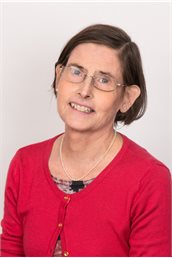 UK DCTN is so welcoming. Attending one of their meetings is like coming home. Which is quite an achievement since there are usually a gathering of 30 people from all sorts of backgrounds around a large horse-shoe table. Researchers, clinicians and patients, like me.
UK DCTN is so welcoming. Attending one of their meetings is like coming home. Which is quite an achievement since there are usually a gathering of 30 people from all sorts of backgrounds around a large horse-shoe table. Researchers, clinicians and patients, like me.
Kindness, knowledge and focus on doing great clinical skin research is quite a heady mix. And so inspirational for me when I joined both the steering group and executive committee in 2009, with another patient. I knew so little about the way research is conducted or most of the 3000 (!) skin disorders.
My lived experience centred around eczema. More particularly around trying to make the lives of my boys better, more normal. Which is why I helped in the setting up of the Nottingham Support Group for Carers of Children with Eczema (another one of Hywel’s initiatives).Driving excellence in research proposals has never come at the cost of a collegiate and supportive atmosphere.
The UK DCTN is a place which welcomes trainees and seems to embrace the mission to widen those involved in producing an evidence base for skin treatments. So they embraced us patients too. Welcoming my inept contributions and helping to make me feel good about my role at the same time. Nurturing my passion that research needs diversity of both participation and patient voice to generate meaningful outcomes which make a difference. Captivating discussions on members’ research proposals are always centre stage at meetings. For a patient it is really inspirational to hear the great and good in the dermatology world bending their minds to patient and carer needs. I do not use the term “great and good” lightly either. During my time with the UK DCTN I met so many of those whose expertise is well recognised and who absolutely care about us patients.Traveling has always appealed to me as a “perk” of joining a committee.
Most of the meetings are in London (in non-covid times) and once a year the AGM is wherever the British Association of Dermatologists is having its annual meeting. Virtual meetings have their uses and certainly came into their own during the lockdown – but a day out, journeying by train and meeting up with everyone almost has a party atmosphere and always with good food.Nourishing is such a good description of UK DCTN. It nourished me, just as it nourishes everyone else within its organisation. It has an unbelievable 1000 members and reaches out with funding awards, fellowships and a journal club. Twenty wonderful years and I wish them many, many more to come.
UK DCTN hitting the spot for acne - Dr Alison Layton
What a difference 10 years can make!
We recognise acne is the commonest inflammatory skin disease seen globally and although the prevalence is most common in adolescents, recent epidemiological data suggest it is starting earlier and lasting longer. We see so many people with acne who suffer a very profound negative impact clinically, socially and psychologically and there are still so many unanswered questions about acne pathogenesis and management. Despite the high prevalence and the burden caused by acne, 10 years ago, it was very clear that acne was not attracting the same amount of attention or research funding when compared to other inflammatory skin diseases. This made it challenging to help us improve our evidence-based approach to managing and improving outcomes for our patients.
In 2012, the UK Dermatology Clinical Trials Network (UK DCTN) came to the rescue by supporting a themed call for Acne. This was the first ever UK DCTN themed call award and we were delighted as a team to receive 10K to help support a James Lind Alliance Acne Priority Setting Partnership (JLA Acne PSP). The Primary Care Dermatology Society also provided a valuable contribution.
I am not sure we actually knew what we were letting ourselves in for as this process attracted 2310 participants and resulted in 6255 important questions about treatment uncertainties. The responses all required some careful sorting into themes and co-ordination with representation from all stakeholders to support voting. Again, the UK DCTN were there to support with Carron Layfield and others helping us to manage the workshops and identify the final top 10.
So what has this achieved? - well, highlighting the most important treatment uncertainties from the JLA Acne PSP, allowed discussion to take place with the NIHR Evaluation, Trials and Studies Coordinating Centre (NETSCC) and the Centre for Evidence Based Dermatology. This informed study ideas and as result, a number of important National Institute for Health Research (NIHR) funding calls became available to support acne related studies. These studies include an HTA supported clinical study Spironolactone for Adult Female Acne (SAFA) led by the fantastic team in Southampton. This has recently been completed, despite the pandemic, with results about to be announced!
An acne programme grant is underway and aims to develop and test an on-line intervention to support self-management and improve outcomes and reduce antibiotic use in acne. A further recent HTA themed call has been commissioned, this will support a dosing and safety study looking at oral isotretinoin for the management of severe acne. All these studies were developed with support throughout from the UK DCTN.
The questions from the JLA Acne PSP have informed several publications including systematic reviews, which support better management and has helped the international Acne Core Research Network (ACORN) to recognise what is important to relevant stakeholders when developing core outcomes. Acne guidelines have also acknowledged the JLA Acne PSP and have identified research areas that require further investigation. There is still much to do!
We all know good research takes time, but thanks to the UK DCTN we have a robust platform of questions to inform our thinking when it comes to selecting research questions about acne. What a difference the generous contribution from the UK DCTN has already made to acne in the last 10 years - a big thank you on behalf of all acne enthusiasts involved in research and I know there are many people with acne who would say the same!
Reflections on the UK DCTN from Tanya Bleiker, past-president of the BAD 2020-2022

The BAD is delighted to celebrate 20 years of the UK DCTN which has played a crucial role in the development of UK dermatology research; improving access to clinical trials and addressing key questions which support the BAD vision of healthy skin for all.
Huge thanks to Professor Hywel Williams whose vision and energy has led to the success of this national treasure! He saw the importance of involving clinicians, nurses, patients and carers to identify the issues and ask every day clinical questions. Questions such as do we give penicillin post cellulitis, do silk clothing or water softeners for children with eczema make a difference, does doxycycline have a place in treating pemphigoid? Simple, yet important, questions that make a difference to the outcome of our patients and would not attract industry funding. Answers that save money for the NHS by reducing admission of people with recurrent cellulitis, by identifying cheaper but effective treatment options and by disinvesting in interventions not found to be effective. By addressing key questions and promoting collaboration the UK DCTN has successfully completed 12 national, independent, clinical trials and secured over £15 million funding. The support that the UK DCTN has from the UK dermatology community is overwhelming, the undivided respect and support of clinicians and the gratitude from patients involved.
Not only has the UK DCTN increased good quality independent clinical trials it has also developed and nurtured UK researchers for the future. Its clinical fellowships have encouraged and enhanced core understanding of clinical research. Many of these fellows are now consultant research leads in their respective departments and have developed their clinical areas of research and are leading their own research teams. This has greatly contributed to dermatology research being undertaken across all of the U.K. and encouraged many departments to take part in these essential clinical studies. Key people have come through the programme including John Ingram, Editor-in-chief BJD, who was one of the first fellows.
The work of the UK DCTN has improved access to research for all dermatology departments and we know that better research activity leads to better patient outcomes in a department. A 2022 research survey carried out by the BAD research subcommittee reported that although most of us agree with the statement ‘Research is every Dermatologists business’, most research active respondents have no funded research time. The commonest reason for not getting involved in research was not having enough funded time, something we must improve by promoting the benefit to patients of research and the need for time to do it.
The BAD and UK DCTN remain closely aligned and have worked closely from the beginning, starting from the initial meetings held at BAD (Willan) House in the early 2000s. Through on-going funding of the UK DCTN infrastructure the BAD supports and invests in what we see as an essential part of delivering UK research. The BAD are proud to support the UK DCTN to enable it to continue in its high quality, independent research whilst promoting research for all. Thank you to all the team at the UK DCTN
Hywel Williams reflections on why he started the UK DCTN 20 years ago

Three things stimulated me to suggest starting up a UK Dermatology Clinical Trials Network. The first was the mismatch between the dermatology research agenda and clinical practice. There was plenty of excellent basic research and placebo-controlled studies from industry for skin disease. But neither of these approaches seemed to deal with the everyday clinical problems and questions I would see in clinic about treatments already in use. Questions such as how does cryotherapy compare with topical salicylic acid for warts?, or how does topical imiquimod really compare to surgical excision for low risk BCC?, or does a strategy of starting treatment of pemphigoid with tetracycline reduce the serious side effects of oral steroids in the elderly? These are the sorts of important clinical questions that industry would never tackle because there is no profit to be made. Industry funded placebo-controlled studies of new products are a good starting point, but I always wanted to know how new treatments compared with existing treatments used well.
The second reason for suggesting a UK DCTN was the principle of empowering front line clinicians and patients in identifying, prioritising, designing and delivering externally funded clinical trials. I have always been interested in hearing patients’ views about research priorities – long before “PPI” has become fashionable in UK clinical research. Patients such as Maxine Whitton would open my eyes to outcomes that are important to them like reduced noticeability of vitiligo patches rather than decreased pigmentation that can still look odd. Although UK academic centres were doing excellent work in prestigious centres, there seemed to be an absence of a joined up clinical research community. We are a small island after all, so why was it not possible to inspire the wider clinical community to engage in addressing uncertainties democratically? Many outstanding UK clinical consultants and trainees had higher degrees and a good research grounding, yet they found themselves overwhelmed in front line work and unable to progress studies that mattered to them. The late Neil Cox once told me “Hywel – I don’t have the time to lead clinical research but I would be very happy to take part in clinical trials led by others independent teams”. Those words validated my passion to set up something on a national scale. Indeed, our first studies of penicillin to prevent cellulitis recurrences were suggested by Neil. The rest of course is history. Delivery of UK DCTN studies was a struggle to begin with but was very enhanced by the establishment of the NIHR Clinical Research Network Dermatology Specialty Group which is still delivering key studies to this day. We were in the right place with the right ideas at the right time to take advantage of the excellent structures that the NIHR were developing at the time.
The final reason for setting up the network was to try and raise standards of independent clinical dermatology research in the UK. As someone who also worked outside of dermatology leading the Trent Institute for Health Research and then chairing national funding panels including Research for Patient Benefit and the NIHR HTA Programme, I had a good idea of what was needed in to make a competitive clinical trials application. A step change in our design and application standard also happened when we started working collaboratively with clinical trial units such as the MRC CTU and later with the Nottingham CTU.
The UK DCTN is a unique collegiate network that now belongs to all of you – I will be formally stepping down as chair after 20+ years in 2024, so I look to all of you to please look after the UK DCTN, nurture it and develop it.